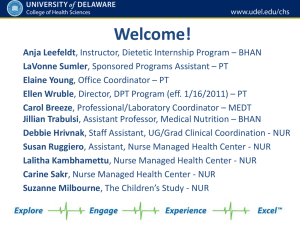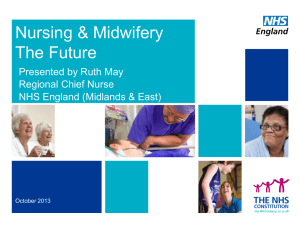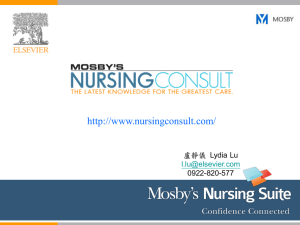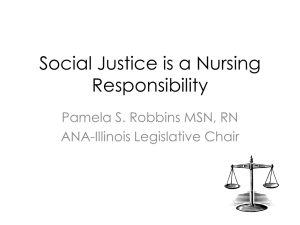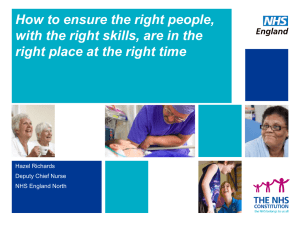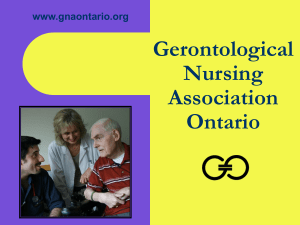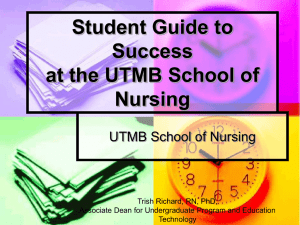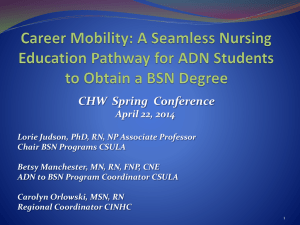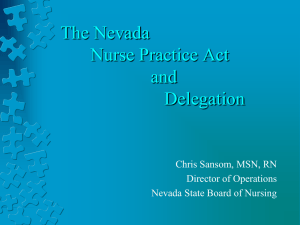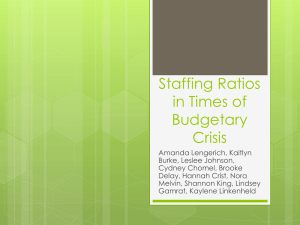VT. Nurse Workforce Background for the Blue Ribbon Commission
advertisement
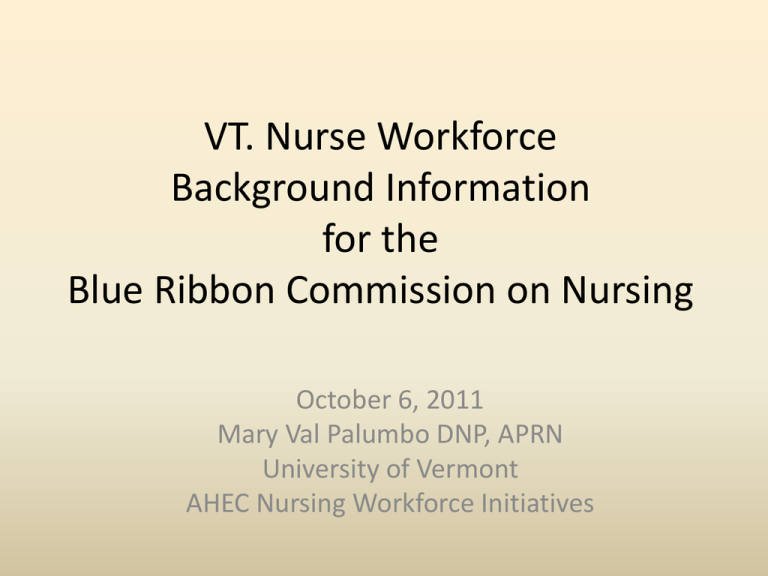
VT. Nurse Workforce Background Information for the Blue Ribbon Commission on Nursing October 6, 2011 Mary Val Palumbo DNP, APRN University of Vermont AHEC Nursing Workforce Initiatives Members of the Nursing Workforce Licensed Nursing Assistant (LNA) 6 wks Licensed Practice Nurse (LPN) 1 yr Registered Nurse Diploma – 3 yr ADN – 2yr Members of the Nursing Workforce Registered Nurse BS or BSN – 4 years Members of the Nursing Workforce – Advanced Practice MSN – Nurse Practitioner, Nurse Anesthetist, Nurse Midwife, Administrator or Educator DNP – Doctor of Nursing Practice PhD – Nurse Scientist/Educator Recent History Blue Ribbon Nursing Commission January, 2001 “Vermont is in the midst of a crisis. The number of nursing students has declined at the same time the number of working nurses who are retiring is increasing. The confluence of these two dynamics has created unacceptably high nursing vacancy rates in hospitals, nursing homes, and home health agencies.” Vermont Association of Hospital and Health Systems Vacancy rates has high as 19% reported in 2003 Recommendations of the Blue Ribbon Nursing Commission January 2001 Create an Office on Nursing Workforce Increase salaries Establish a marketing partnership and X Develop a Scholarship Program Fund a Loan Forgiveness Program Increase capacity of nursing schools Expand continuing education programs Age of RN’s Working in VT 42% 38% 26% 24% 20% 19% 14% 7% 7% 6% 20-30 31-40 41-50 51-60 61+ Years of Age Board of Nursing Relicensure Surveys in 2001 n = 6,008 (85% response rate) 2009 n = 3,627 (54% response rate) 2001 2009 The Nurse Age Dilemma 30% 25% 19%19% 20% Employed Vermont 15% nurses 10% 5% 14% 10% 12% 7% 7% 4% 7% 2% <2 5 25 -2 9 30 -3 4 35 -3 9 40 -4 4 45 -4 9 50 -5 4 55 -5 9 60 -6 4 65 + 0% Years of Age 2009 RN Relicensure Survey completed in March, 2009 by 3,627 VT employed nurses (54% response rate) 2001- 2003 Focus on Recruitment Educational change over decade Five Vermont schools of nursing VTC – online re-entry, LPN, ADN expanded Southern VT college – ADN, RN to BSN UVM – BS, RN to BSN expanded, MS Castleton – ADN, new BSN, RN to BSN Norwich – BSN, MSN nursing admin/education Plans: VTC - BSN, UVM - DNP Educational Level of Vermont Nurses • 17% completed a Diploma program in nursing • 40% completed an Associate’s Degree in nursing • 35% completed a Bachelor’s Degree in nursing • 5% completed a Master’s Degree in nursing • <1% completed a Doctoral degree From re-licensure survey was completed in March, 2009 by 3,627 VT employed nurses (54% response rate) Vermont Nurse Graduates 1999-2011 350 301 300 250 200 150 129 169 100 50 19 99 20 00 20 01 20 02 20 03 20 04 20 05 20 06 20 07 20 08 20 09 20 10 20 11 0 Total RN VTC LPN UVM CSC S.VT.C VTC AD Norwich Vermont Nurse Graduate by Type/Degree 2011 LPN, 36% BS or BSN, 23% BS or BSN Associates, 41% *Does not count – RN to BSN graduates in 2011 Associates LPN 2011 RN Graduates in Vermont VTC, CSC, SVC Associate Degree, 65% BS or BSN Associate Degree BS or BSN, 35% UVM, Norwich Applications to UVM Masters Program in Nursing 2000 to 2011 180 160 154 140 131 120 137 147 134 100 80 77 86 60 40 20 0 17 26 10 13 25 00 001 002 003 004 005 006 007 008 009 010 011 0 2 2 2 2 2 2 2 2 2 2 2 2 Applicants to Graduate Nursing Program Nursing Masters' Degrees in Vermont 1999 to 2011 55 50 45 40 35 30 25 20 15 10 5 0 1 2 27 27 4 21 10 6 12 10 7 12 8 8 1 4 3 5 18 UVM Clinical Systems Management Norwich Administration/Educator UVM Psych/Mental Health 1 12 99 000 001 002 003 004 005 006 007 008 009 010 011 9 1 2 2 2 2 2 2 2 2 2 2 2 2 UVM NP 2005-2009 Policy Work • In Collaboration with AHEC and other stakeholders: – Nurse Faculty Loan Repayment – October Designated as Health Care Career Awareness Month – Workforce Development Partners (grant and policy work) Infrastructure to collect and analyze health care workforce data • Office of Nursing Workforce collected 10 years of Vermont Supply and Demand data which is available at http://www.choosenursingvermont.org/ • Vermont Board of Nursing is now working with the National Council of State Boards of Nursing to collect a “Minimum Data Set” electronically with relicensure of RNs, LPNs, and APRNs. • Office of Nursing Workforce (now AHEC)has published studies on educational determinants of satisfaction and retention, intention to leave, emergency preparedness, youth perceptions of a nursing career, nurse perceptions of their health and safety and their employers attention to same. (2004-11) Implement nurse residency programs Vermont Nurses In Partnership, Inc. (VNIP) provides an international forum for nurse leaders from academia, regulation and various practice settings that are working to improve transition to practice for direct care providers. The forum has grown from the initial 45 Vermont-based members, to a coalition of over 500 nurse leaders from across the nation and around the world. http://www.vnip.org/ Remove scope-of-practice barriers As of June 1, 2011, experienced nurse practitioners are no longer required to have a written “collaborative agreement” with an MD. Scope of practice barriers remain for APRNs and RNs 22 Magnet Hospitals • Southwestern Vermont Medical Center (X3) • Rutland Regional Medical Center • Dartmouth Hitchcock Medical Center (X2) A hospital where nursing delivers excellent patient outcomes, where nurses have a high level of job satisfaction, and where there is a low staff nurse turnover rate and appropriate grievance resolution. Magnet status is also said to indicate nursing involvement in data collection and decision-making in patient care delivery . Segen's Medical Dictionary. © 2011 New challenges for Nurses • Vermont Blue Print for Health requires attention to health promotion and population health • Transition to Electronic Medical Records requiring nurse input • Health care reform and primary care provider shortage. Old Challenges • Nursing faculty shortage • Availability of clinical placement sites for nursing programs • Nurse health and safety (older and younger) • Pending retirement of half the workforce • Interest in caring for elders Why you? Why us? Why now? IOM Future of Nursing Report Vermont Healthcare reform - Blueprint for Health and Act 48 Blue Ribbon Commission on Nursing – A chance to transform system to improve care Access +200,000 Quality Add value while slowing costs

